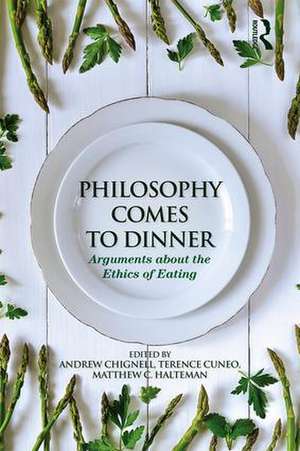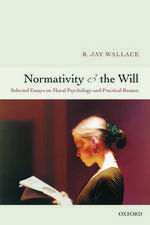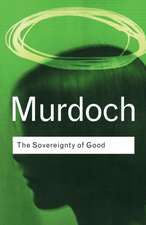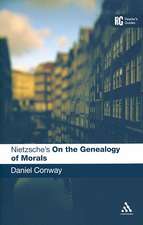Philosophy Comes to Dinner: Arguments About the Ethics of Eating
Editat de Andrew Chignell, Terence Cuneo, Matthew C. Haltemanen Limba Engleză Paperback – 23 oct 2015
| Toate formatele și edițiile | Preț | Express |
|---|---|---|
| Paperback (1) | 387.75 lei 6-8 săpt. | |
| Taylor & Francis – 23 oct 2015 | 387.75 lei 6-8 săpt. | |
| Hardback (1) | 1057.09 lei 6-8 săpt. | |
| Taylor & Francis – 2 noi 2015 | 1057.09 lei 6-8 săpt. |
Preț: 387.75 lei
Nou
Puncte Express: 582
Preț estimativ în valută:
74.20€ • 77.03$ • 61.87£
74.20€ • 77.03$ • 61.87£
Carte tipărită la comandă
Livrare economică 22 martie-05 aprilie
Preluare comenzi: 021 569.72.76
Specificații
ISBN-13: 9780415806831
ISBN-10: 0415806836
Pagini: 320
Dimensiuni: 152 x 229 x 18 mm
Greutate: 0.41 kg
Ediția:New.
Editura: Taylor & Francis
Colecția Routledge
Locul publicării:Oxford, United Kingdom
ISBN-10: 0415806836
Pagini: 320
Dimensiuni: 152 x 229 x 18 mm
Greutate: 0.41 kg
Ediția:New.
Editura: Taylor & Francis
Colecția Routledge
Locul publicării:Oxford, United Kingdom
Cuprins
0. Matthew C. Halteman, Terence Cuneo, Andrew Chignell, "Introduction". I. Dietary Ideals. 1. Terence Cuneo, "Conscientious Omnivorism". 2. Christina Van Dyke, "Manly Meat and Gendered Eating: Correcting Imbalance and Seeking Virtue". 3. Benjamin J. Bruxvoort Lipscomb, "’Eat Responsibly:’ Agrarianism and Meat". 4. Tristram McPherson, "Why I Am a Vegan (and You Should Be One Too)". 5. Dan Hooley and Nathan Nobis, "A Moral Argument for Veganism". 6. Tyler Doggett and Andy Egan, "Non-Ideal Food Choices". 7. Matthew C. Halteman and Megan Halteman Zwart, "Philosophy as Therapy for Recovering (Unrestrained) Omnivores". II. Puzzling Questions. 8. Ted A.Warfield, "Eating Dead Animals: Meat Eating, Meat Purchasing, and Proving Too Much". 9. Mark Budolfson, "Consumer Ethics, Harm Footprints, and the Empirical Dimensions of Food Choices". 10. Andrew Chignell, "Can We Really Vote with Our Forks? Opportunism and the Threshold Chicken". 11. Adrienne M. Martin, "Factory Farming and Consumer Complicity". 12. Elizabeth Harman, "Eating Meat as a Morally Permissible Moral Mistake". 13. Anne Barnhill, "Does Locavorism Keep It Too Simple?". 14. David M. Kaplan, "What’s Wrong with Artificial Ingredients?". 15. Jeff McMahan, "The Moral Problem of Predation"
Recenzii
"Whether your food choices are void of ethical meaning to you or you consider yourself an eminently ethical eater,Philosophy Comes to Dinner offers serious food for thought. If you’re hungry to challenge your own ethical notions about food, check this book out."
Paul Shapiro, The Humane Society of the United States
"The act of eating involves ethical decisions, and yet most of us eat without contemplation—we exclude philosophy from our thought process, and instead make our dietary choices almost exclusively based on price and taste. Philosophy Comes to Dinner: Arguments about the Ethics of Eating aims to change that, and it does so with a diverse collection of essays that attacks the moral question of what to eat from a wide and intriguing range of perspectives. This important book should be read by everyone who eats."
Bruce G. Friedrich, Farm Sanctuary
"A really brilliant collection. I've never seen such rational jujitsu on such a deadly subject. Bound to become a classic of practical philosophy."
Andrew Linzey, director of the Oxford Centre for Animal Ethics and author of Animal Theology
"It is difficult to stress how much we need this gem of a book. Concerned consumers have been discussing food reform for decades. An entire social movement has even formed around the issue. But—somewhat astonishingly—we have yet to think systematically about the ethical implications of our proposals. Philosophy Comes to Dinner changes that. In a culinary world marked by simplistic and polarized extremes—organic versus conventional, free trade versus fair trade, local versus global food, vegan versus "conscientious carnivore," and so on— it asks us (very politely, no less) to exchange ideology for reflection and systematically explore why we’re making the food choices we make. You may not walk away with all the answers--that would be very dull-- but you will never look at the contemporary food issues the same way again."
James McWilliams, author of The Modern Savage and Just Food
"The essays collected in this timely volume tackle a wide range of important ethical questions about our food system in a manner that is both argumentatively rigorous and accessible - both the scholar and the non-specialist will find much to chew on here."
Kate Nolfi, University of Vermont, USA
"In recent years, I’ve seen an explosion of student and public interest in the politics and ethics of food. It’s great to have philosophers contributing to this discussion, and this book explains why."
Marion Nestle, New York University, USA, and author of Food Politics
"In the last few years much has been written that should psychologically (and perhaps physically) unsettle those who eat the typical American diet. This book ups the ante. Not only does it contain important new arguments, it is packed with provocative new questions. The publication of this book marks the emergence of the philosophy of food as a vibrant new field of inquiry."
Dale W. Jamieson, New York University
"Whether your food choices are void of ethical meaning to you or you consider yourself an eminently ethical eater,Philosophy Comes to Dinner offers serious food for thought. If you’re hungry to challenge your own ethical notions about food, check this book out."
Paul Shapiro, The Humane Society of the United States
"A really brilliant collection. I've never seen such rational jujitsu on such a deadly subject. Bound to become a classic of practical philosophy."
Andrew Linzey, director of the Oxford Centre for Animal Ethics and author of Animal Theology
"It is difficult to stress how much we need this gem of a book. Concerned consumers have been discussing food reform for decades. An entire social movement has even formed around the issue. But—somewhat astonishingly—we have yet to think systematically about the ethical implications of our proposals. Philosophy Comes to Dinner changes that. In a culinary world marked by simplistic and polarized extremes—organic versus conventional, free trade versus fair trade, local versus global food, vegan versus "conscientious carnivore," and so on— it asks us (very politely, no less) to exchange ideology for reflection and systematically explore why we’re making the food choices we make. You may not walk away with all the answers--that would be very dull-- but you will never look at the contemporary food issues the same way again."
James McWilliams, author of The Modern Savage and Just Food
"In recent years, I’ve seen an explosion of student and public interest in the politics and ethics of food. It’s great to have philosophers contributing to this discussion, and this book explains why."
Marion Nestle, New York University, USA, and author of Food Politics
"The book as a whole is accessible to non-philosophical audiences and would be a fertile resource for people inside or outside philosophy looking to get up to speed on the current state of the food ethics debate. I enthusiastically recommend you pull up a chair to the philosophy dinner table and enjoy the conversation."
Notre Dame Philosophical Reviews
Paul Shapiro, The Humane Society of the United States
"The act of eating involves ethical decisions, and yet most of us eat without contemplation—we exclude philosophy from our thought process, and instead make our dietary choices almost exclusively based on price and taste. Philosophy Comes to Dinner: Arguments about the Ethics of Eating aims to change that, and it does so with a diverse collection of essays that attacks the moral question of what to eat from a wide and intriguing range of perspectives. This important book should be read by everyone who eats."
Bruce G. Friedrich, Farm Sanctuary
"A really brilliant collection. I've never seen such rational jujitsu on such a deadly subject. Bound to become a classic of practical philosophy."
Andrew Linzey, director of the Oxford Centre for Animal Ethics and author of Animal Theology
"It is difficult to stress how much we need this gem of a book. Concerned consumers have been discussing food reform for decades. An entire social movement has even formed around the issue. But—somewhat astonishingly—we have yet to think systematically about the ethical implications of our proposals. Philosophy Comes to Dinner changes that. In a culinary world marked by simplistic and polarized extremes—organic versus conventional, free trade versus fair trade, local versus global food, vegan versus "conscientious carnivore," and so on— it asks us (very politely, no less) to exchange ideology for reflection and systematically explore why we’re making the food choices we make. You may not walk away with all the answers--that would be very dull-- but you will never look at the contemporary food issues the same way again."
James McWilliams, author of The Modern Savage and Just Food
"The essays collected in this timely volume tackle a wide range of important ethical questions about our food system in a manner that is both argumentatively rigorous and accessible - both the scholar and the non-specialist will find much to chew on here."
Kate Nolfi, University of Vermont, USA
"In recent years, I’ve seen an explosion of student and public interest in the politics and ethics of food. It’s great to have philosophers contributing to this discussion, and this book explains why."
Marion Nestle, New York University, USA, and author of Food Politics
"In the last few years much has been written that should psychologically (and perhaps physically) unsettle those who eat the typical American diet. This book ups the ante. Not only does it contain important new arguments, it is packed with provocative new questions. The publication of this book marks the emergence of the philosophy of food as a vibrant new field of inquiry."
Dale W. Jamieson, New York University
"Whether your food choices are void of ethical meaning to you or you consider yourself an eminently ethical eater,Philosophy Comes to Dinner offers serious food for thought. If you’re hungry to challenge your own ethical notions about food, check this book out."
Paul Shapiro, The Humane Society of the United States
"A really brilliant collection. I've never seen such rational jujitsu on such a deadly subject. Bound to become a classic of practical philosophy."
Andrew Linzey, director of the Oxford Centre for Animal Ethics and author of Animal Theology
"It is difficult to stress how much we need this gem of a book. Concerned consumers have been discussing food reform for decades. An entire social movement has even formed around the issue. But—somewhat astonishingly—we have yet to think systematically about the ethical implications of our proposals. Philosophy Comes to Dinner changes that. In a culinary world marked by simplistic and polarized extremes—organic versus conventional, free trade versus fair trade, local versus global food, vegan versus "conscientious carnivore," and so on— it asks us (very politely, no less) to exchange ideology for reflection and systematically explore why we’re making the food choices we make. You may not walk away with all the answers--that would be very dull-- but you will never look at the contemporary food issues the same way again."
James McWilliams, author of The Modern Savage and Just Food
"In recent years, I’ve seen an explosion of student and public interest in the politics and ethics of food. It’s great to have philosophers contributing to this discussion, and this book explains why."
Marion Nestle, New York University, USA, and author of Food Politics
"The book as a whole is accessible to non-philosophical audiences and would be a fertile resource for people inside or outside philosophy looking to get up to speed on the current state of the food ethics debate. I enthusiastically recommend you pull up a chair to the philosophy dinner table and enjoy the conversation."
Notre Dame Philosophical Reviews
Notă biografică
Andrew Chignell is Associate Professor at Cornell University. His research focuses on Kant and other early modern philosophers. Topically he has worked on epistemology, aesthetics, and philosophy of religion. He is the co-instructor of "The Ethics of Eating" Massive Online Open Course on Edx.org and a contributor to the Oxford Handbook of Food Ethics.
Terence Cuneo is the Marsh Professor of Intellectual and Moral Philosophy at the University of Vermont. He is the author of The Normative Web (2007), Speech and Morality (2014), and Ritualized Faith (2016).
Matthew C. Halteman is Associate Professor of Philosophy at Calvin College and a fellow in the Oxford Centre for Animal Ethics. He is the author of Compassionate Eating as Care of Creation (2008).
Terence Cuneo is the Marsh Professor of Intellectual and Moral Philosophy at the University of Vermont. He is the author of The Normative Web (2007), Speech and Morality (2014), and Ritualized Faith (2016).
Matthew C. Halteman is Associate Professor of Philosophy at Calvin College and a fellow in the Oxford Centre for Animal Ethics. He is the author of Compassionate Eating as Care of Creation (2008).
Descriere
Everyone is talking about food. Chefs are celebrities. "Locavore" and "freegan" have earned spots in the dictionary. Popular books and films about food production and consumption are exposing the unintended consequences of the standard American diet. Questions about the principles and values that ought to guide decisions about dinner have become urgent for moral, ecological, and health-related reasons. In Philosophy Comes to Dinner, twelve philosophers—some leading voices, some inspiring new ones—join the conversation, and consider issues ranging from the sustainability of modern agriculture, to consumer complicity in animal exploitation, to the pros and cons of alternative diets.














